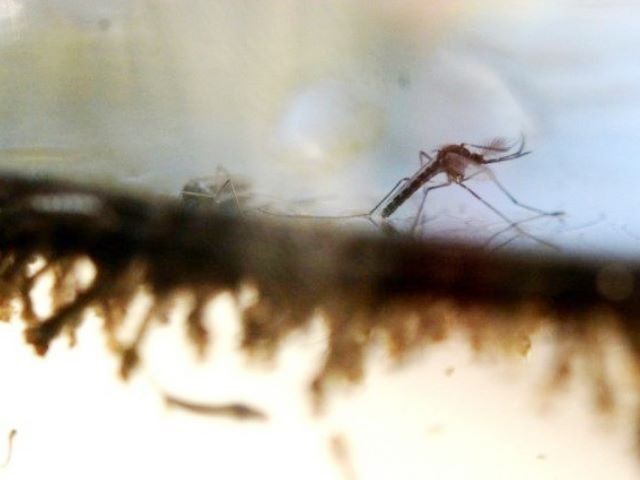Texas Department of State Health Services (TDSHS) expressed concerns that Zika-carrying mosquitoes could bring the virus from Mexico into the United States.
“It certainly would not be a surprise at all if we see some locally transmitted cases of Zika in Texas,” said Chris Van Deusen, spokesman for the TDSHS, the Brownsville Herald reported Sunday, April 17.
Zika is a virus spread through the bite of an infected mosquito. Although considered mild for most who contract the illness, the U.S. Centers for Disease Control and Prevention (CDC) concluded the virus was a threat to pregnant women as “a cause of microcephaly and other severe fetal brain defects.” They continue to warn pregnant women to avoid travel to Zika affected countries. The virus is also linked to increased risk for Guillain-Barré syndrome, rare paralysis disease.
Reportedly, local Aedes aegypti mosquitoes transmit the virus in Mexico. The TDSHS spokesman commented that this type of mosquito exists in southeast Texas, along the Gulf coast and a few other pockets within the state. The CDC also lists another mosquito type, the Aedes albopictus, as a carrier.
In January, Dr. Peter Hotez, Dean of the National School of Tropical Medicine at Baylor College of Medicine, voiced concern that the Texas Gulf Coast could be “hardest hit’ in a Zika outbreak since the virus is spread by Aedes mosquitoes that also carry Dengue fever, prevalent on the Texas-Mexico border, and Chikungunya, which first entered the Lone Star State in 2014, with more cases last year, Breitbart Texas reported. These Zika-carrying mosquitoes like to reproduce in standing water close to humans. Hotez cited Houston’s economically depressed areas as prime breeding grounds.
Van Deusen noted: “What we still expect is that we may well see a pattern that’s something like we see with Dengue fever. Zika and Dengue are very similar viruses.”
According to the Brownsville newspaper, the TDSHS spokesman explained that when a big Dengue epidemic occurs across the border in areas such as Tamaulipas, Mexico, officials do see some locally transmitted Dengue cases in the Rio Grande Valley. He hypothesized this could be the case for Zika-carrying mosquitoes and not a situation where the virus will be “widespread.” Van Deusen noted: “… obviously we want to delay cases like that or prevent it altogether.”
The CDC confirmed local mosquito transmission of the Zika virus in Mexico. By definition, that means mosquitoes native to the region are infected with Zika and spread it to people. On April 14, Mexican health officials confirmed 222 Zika cases of which 53 were pregnant women, seven who were not affected by the virus. Mexico continues to monitor ongoing pregnancies for microcephaly through ultrasound, testing available to pregnant women in 51 hospitals across 32 states.
Travel magazine Baja Insider reported while no reported cases of Zika virus have been recorded in Baja California or Baja California Sur, to date, those reported occurred in Chiapas, Oaxaca, Nuevo Leon, Guererro, Jalisco, Michoacán, Veracruz,Nayarit, Sinoloa, Tabasco Veracruz, and Yucatan. As reported by the Herald, Van Deusen doesn’t believe the virus has reached all parts of Mexico.
In January, Van Deusen commented that they are monitoring the illness because of the likelihood it could spread further, indicating their biggest concern is for those traveling to high risk areas and bringing the virus back with them into Texas.
Mary Suzanne Whitworth, M.D. medical director of Infectious Diseases at Cook Children’s, recently addressed the CDC’s concern that Zika virus is “a bit scarier than we initially thought.” Whitworth was concerned that that this news would fuel fears about Zika. She highlighted that, to date, Zika transmission from local mosquitoes in the U.S. has not occurred and all cases originated with individuals who traveled to Zika infested regions and became infected through a mosquito bite.
However, Zika is now known to be a sexually transmitted disease. The first cases of infection through male-to-female vaginal intercourse and through male-to-male anal sex were diagnosed in Dallas.
Whitworth stated the reason why mosquito-borne illnesses have not spread as much in the United States is likely improved mosquito vector control and air conditioning. More people remain inside more and don’t sleep with open windows receiving less exposure to the winged insect. Preventative measures like wearing insect repellent play a significant role.
According to the Brownsville newspaper, no local mosquitoes in Cameron County have been found to carry Zika, virus, although they note that TDSHS does not know if Zika will be a bigger issue than originally believed.
“We want people to protect themselves so that they don’t bring the virus back and introduce it to mosquitoes here,” Van Deusen said. “Of course, we recommend that people protect themselves from mosquito bites here as well.”
Follow Merrill Hope on Twitter @OutOfTheBoxMom.

COMMENTS
Please let us know if you're having issues with commenting.